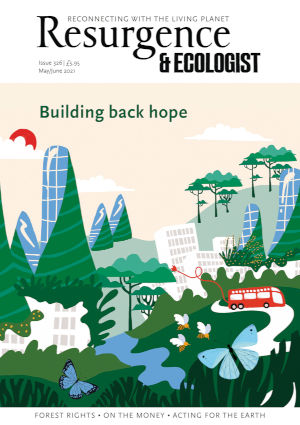The defining question of our age: how do I persuade you that I am right and, perhaps, you are wrong? How do those of us who are passionate about preventing climate breakdown, ending exploitation and suffering persuade those who, well, erm, ahem, just don’t seem to want to listen?
There is an inordinate amount of expertise on communications out there. The environmental sector, for example, is highly professionalised, watching and learning from advanced and effective corporate marketing. Edward Bernays, a nephew of Sigmund Freud, revolutionised advertising by deploying messaging that resonated with our unconscious. The use of framing and storytelling is prevalent, we segment audiences, and we package campaigns as solutions to people’s emotional needs.
But this kind of persuasion is designed to be simple, digestible and with modest outcomes: buy this brand rather than that, sign this petition or donate to that cause. Click, click, click. At the same time the challenges we face seem greater, more intractable. The alt-right has also engaged with storytelling, simple messaging, and appeals to unconscious drives. Social media by design segments, reinforces and rewards controversy, extremity and even direct harm. The best of us can end up shouting into the void that is Facebook.
A common feature of the problems we face today is that they are extremely complex. Climate breakdown is a disturbance of the dynamic equilibrium of the Earth’s biosphere and atmosphere. To prevent ecological collapse we need a fundamental and universal transformation in our economic systems. Animal welfare, a seemingly less unwieldy issue, engages our understanding of consciousness, sentience, mind, ethics and empathy. These are some of the most unfathomable phenomena in our universe.
It seems unlikely that such complex problems can be reduced to simple one-step sound-bite solutions. Which brings us back to this question: how do I, a complex human with a unique history of experiences, social positions, heuristic associations, catalogue of books read and unconscious preferences, persuade just one other person that I am right and they are wrong. How can we agree? How do we scale that to millions or billions of others?
These questions are addressed in How to Disagree: Negotiating Difference in a Divided World by Adam Ferner and Darren Chetty. The authors survey thousands of years of philosophy from a wide variety of voices and cultural and social sources. They lean into the problem of complexity and the discomfort of disagreement. Indeed, they achieve the seemingly impossible: harnessing and presenting some of the most thoughtful work on persuasion so that it is accessible, indeed enjoyable to engage with, and of practical use.
The book discusses the most important and volatile issues of our current times, including climate change, veganism, racism, patriarchy, colonialism. But there is no attempt to provide killer arguments. Instead, we learn a practice of discussion that fosters empathy and understanding. This is an indispensable resource for those who have not yet been able (or willing) to engage with issues such as white privilege. It is equally useful for those who are already deeply immersed in current social justice debates. It provides the clearest and most compelling explanation of epistemic exploitation that I have encountered so far.
How to Disagree has been written to provide practical solutions to our difficult problems. A common theme is that even as we agree to disagree, we need to open ourselves to connection and reconnection. The advice is usefully prescriptive. This includes a reminder that we need to eat together, to change places. We are encouraged to use and also understand the impact of humour. It describes how we can ask genuinely open questions and be present in the answers. It explains and encourages self-care.
Ferner and Chetty have evidently spent considerable intellectual labour developing this book as an educational resource. We are guided from the more familiar to what might be considered more advanced. The journey is an interesting and enjoyable one, but no less challenging for that. Each chapter ends with clear action points. These can seem obvious. During a discussion, pay attention to your feelings and try to sense the feelings of others. But now these questions seem more poignant, and we move from assuming we know to reflecting.
There is no person engaged in environmental or social advocacy who would not benefit from reading How to Disagree. Even if you already know everything about persuading others (ahem) this crisp guide serves as a useful digest.







